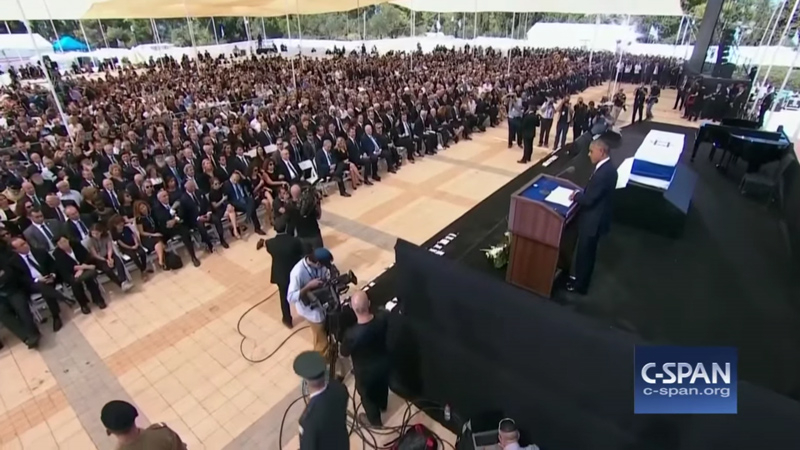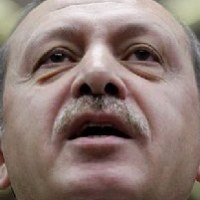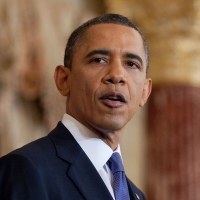![]()
Tuesday, October 25, 2016 | by Guy Millière
Originally published by Gatestone Institute. Republished with permission.

At the funeral of Shimon Peres in Jerusalem, standing before representatives from 75 countries, Barack Obama delivered a speech that could have resembled a mark of heartwarming friendship, until he evoked the “the unfinished business of peace talks,” followed by a harsh and negative portrayal of Israel. (Video grab: C-Span)
The death of former Israeli President Shimon Peres led to a wave of almost unanimous tributes. Representatives from 75 countries came to Jerusalem to attend the funeral. Palestinian Authority (PA) President Mahmoud Abbas even left Ramallah for a few hours to show up.
Such a consensus could seem to be a sign of support for Israel, but it was something else entirely.
Those who honored the memory of Shimon Peres put aside the years he dedicated to creating Israel’s defense industry and to negotiating key arms deals with France, Germany and the United States. Those who honored the memory of Peres spoke only of the man who signed the Oslo Accords and who embodied the “peace process.” They then used the occasion to accuse Israel.
Barack Obama delivered a speech that could have resembled a mark of heartwarming friendship, until he evoked the “the unfinished business of peace talks.” A harsh and negative sentence followed, saying that “the Jewish people weren’t born to rule another people.” The next sentence implied that Israel is behaving like a slave-owner: “From the very first day we are against slaves and masters;” but it is clear to anyone in Israel that there is no such relationship even resembling that. His conclusion followed: “The Zionist idea will be best protected when Palestinians will have a state of their own.”
British Prime Minister Theresa May and French President François Hollande issued press releases in the same direction.
Despite the unceasing waves of murdering innocent Israeli civilians, Western politicians speak as if Israel were not under attack. They are not interested in seeing the spilled blood, the threats, the hatred constantly spread by Palestinian newspapers, and the incessant and ugly consequences of that hatred. European and American politicians are not interested in hearing what Palestinian leaders say when they call for the ethnic cleansing of Jews. These leaders seem happy to forget the chaos in the Middle East, the ruthless global violence of Islamic extremists, and the outspoken, genocidal intentions of the rulers of Iran. Instead, they speak abstractly of “peace” as if it is something that can be dropped down from sky on people who every day are threatening to kill the Jews.
These politicians practice willful blindness and seem obsessed by a desire illegally to impose the creation of a Palestinian state — whatever the consequences for Israel. These Western leaders can well imagine what those consequences would be if the Arabs had their way: genocide. One can only assume they are pleased with that.
Israelis, however — Muslims, Christians and Jews — cannot practice willful blindness. The spilled blood is not an abstract headline; it is their red blood. The threats, the hatred and the consequences of that hatred are real. Israelis hear clearly what the Palestinian leaders say. They cannot forget what is happening in the Middle East: Jerusalem is 150 miles from Damascus and 1000 miles from Tehran; Hezbollah has more 120,000 missiles aimed at Israel from Lebanon.
Hamas, a designated terrorist group openly dedicated to destroying Israel, rules Gaza just a few miles away. Israelis note the genocidal threats from Iran: Iran can obtain nuclear weapons at any time, along with long-range missiles to deliver them.
Even though many Israeli citizens were proud to see that so many Western leaders came to honor Shimon Peres, they were not fooled. A recent survey showed that only 28% of the Israeli population believe that a peace agreement is even conceivable; 64% think no agreement will ever be signed. Another survey from July 2016 showed that a clear majority of Israelis are opposed to any withdrawal from Judea and Samaria, and resolutely hostile to any foreign interference in Israeli affairs.
Israeli Prime Minister Benjamin Netanyahu politely received Western leaders when they came to Jerusalem. He paid tribute to Shimon Peres — without omitting the first decades of Peres’ life. He also answered those who speak of “peace” as if no other factors mattered, and firmly stated his position: security comes first; there is no way that peace can exist without security.
Netanyahu listened to Obama’s speech. He doubtless read the press releases of Theresa May and François Hollande. He could easily decipher the innuendos in those speeches and press releases: the same innuendos have been used by Western politicians for a quarter of a century.
Netanyahu has acted to make Israel immune to attacks and Western pressure. Despite tensions and disagreements with the Obama administration, he managed to maintain robust ties of friendship between Israel and the United States, and negotiated a US military-aid agreement of $38 billion over ten years.
Seeing that Russian President Vladimir Putin has come to occupy one of the places in the Middle East left invitingly vacant by the Obama administration, Netanyahu established working relations with Putin and used the relationship to contain Syria’s chaos and ensure that it would not overflow into Israel. Netanyahu also used those relations to curb Hezbollah’s and Iran’s activities on the Golan Heights and in South Lebanon, and to try to reconcile with Turkey.
Understanding that economic relations between Israel and Europe could deteriorate, he set about negotiating free trade agreements with China, India, South Korea and Japan, and he signed economic and military cooperation agreements with seven African countries also threatened by Islamic terrorism (Uganda, Ethiopia, Kenya, Rwanda, South Sudan, Tanzania and Zambia).
Realizing that Sunni Arab countries were concerned about the rising regional power of Iran, he strengthened strategic ties with Jordan and Egypt. Egyptian Foreign Minister Sameh Shoukry visited Israel in July, and a few weeks ago, the deputy chief of staff of the Israel Defense Forces (IDF), Yair Golan, said that military cooperation between Israel, Egypt and Jordan had never been closer.
Netanyahu began a rapprochement between Israel and Saudi Arabia; in April 2016, Saudi prince Al-Waleed bin Talal of Saudi Arabia became the first honorary ambassador to Israel. A few months earlier, the opening of an Israeli diplomatic office in the United Arab Emirates, in Abu Dhabi, was announced.
Against all odds, Israel is now in a much stronger position than it was even a few years ago.
Netanyahu also probably realized that even if Western politicians want to impose the creation of a Palestinian state, Sunni Arab leaders, Russia, and even Iran, despite the inflammatory mullahs, consider that the issue can presently be placed on the back burner until the multiple fires that plague the region calm down; it seems evident they will not calm down any time soon.
Netanyahu also doubtless sees that Abbas came to Jerusalem because Western leaders are now his main protectors, and that Abbas’s usual accusatory speech before the UN General Assembly in New York this year was received by the press and diplomats as a side show.
Netanyahu assuredly also sees that Sunni Arab leaders have had enough of Abbas; that they want normalization between the Arab world and Israel, and that they have a plan that basically envisions relieving Abbas of his position.
Netanyahu also cannot help seeing that France and other Western powers are preparing anti-Israeli maneuvers and are ready to support questionable resolutions at the UN. A recent article in the Weekly Standard said that the Obama administration is “manufacturing a crisis with Israel in anticipation of a post-election diplomatic push targeting the Jewish state.”
Netanyahu emphasized, when it was his turn to speak before the United Nations, a few hours after Mahmoud Abbas, that Israel is not isolated, and that it will not accept having unacceptable conditions dictated to it.
Both Netanyahu and the Israeli government apparently consider that a page of history has been turned, and that the centrality of the Israeli-Palestinian conflict in Middle East peace essentially belongs to the past.
In private, some people say that the burial of Shimon Peres was also the burial of the Oslo Accords and of a never-ending “peace process” that brought only war.
In 2009, Daniel Pipes wrote that “Israelis eventually must return to their pre-1993 policy of establishing that Israel is strong, tough, and permanent.” Israel is going in this direction.
Another eminent scholar, Walter Russell Mead, noted recently that Netanyahu’s successes “will not and cannot make Israel’s problems and challenges go away,” but that they put Israel in a much “stronger global position.” Mead added that if and when American liberals understand the causes of Netanyahu’s successes, “a new and smarter era of foreign policy debate” might begin.
Western politicians would do well to listen.
Dr. Guy Millière, a professor at the University of Paris, is the author of 27 books on France and Europe.



 RSS
RSS










Latest Comments
Hello Mike, Thank you for your positive feedback to the article. I felt there wasn’t too much critical analysis of ...
Thanks for this considered and well constructed article. A follow up article on the manner in which the editorial contro...
THE CLUELESSNESS OF CLAIMING THAT OBAMA'S MIDDLE EAST POLICIES WERE A FAILURE CANNOT BE FURTHER FROM THE TRUTH, WHAT THE...
As long as Obama is the president of the usa do not trust the us government......
Thank you for an good read....